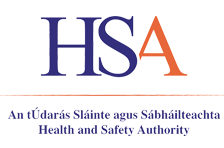Press Releases 2026
-
20Feb
Meade Potato Company Unlimited fined €150,000 following an incident in which an employee’s arm was trapped in machinery
Today, Friday 20th February 2026, at Trim Circuit Criminal Court, Judge John Martin imposed a fine of €150,000 on Meade Potato Company Unlimited following a serious work-related incident which occurred at the company’s premises on 30th June 2022.
-
16Feb
‘Falls are preventable’: New All-Island Construction Safety Campaign Begins
This joint effort will see inspections taking place on construction sites of all sizes across the island, with the goal of reducing the number of serious injuries and fatalities linked to work at height.
-
23Jan
New agreement allows HSA to deploy drones to assist in serious incident investigations
The Health and Safety Authority (HSA) has signed a Memorandum of Understanding (MOU) with AirNav Ireland to enable the safe and coordinated operation of HSA drones within controlled Irish airspace during serious workplace incident investigations.
-
19Jan
HSA to launch national inspection campaign focusing on safe handling of livestock ahead of calving season
The Health and Safety Authority (HSA) will begin a two‑week farm safety inspection campaign today, Monday, 19th January 2026, focusing on the safe management of livestock in the lead‑up to the busy calving season. Inspectors will be visiting farms nationwide to highlight key risks and ensure farmers have appropriate controls in place when working with cattle and other livestock.
-
16Jan
Kildare Chilling Company fined €225,000 following a fatal accident on the 14th of May 2020
Today, Friday 16th January 2026, at Kildare Circuit Court sitting in Naas, Judge Elva Duffy imposed a fine of €225,000 on Kildare Chilling Company Unlimited Company.
-
05Jan
Health and Safety Authority reports sharp rise in work-related fatalities in 2025
The Health and Safety Authority (HSA) has today (Monday 5th January) published provisional figures showing that 58 people died in work-related incidents in Ireland during 2025, representing a 61% increase on the 36 who died in 2024.
